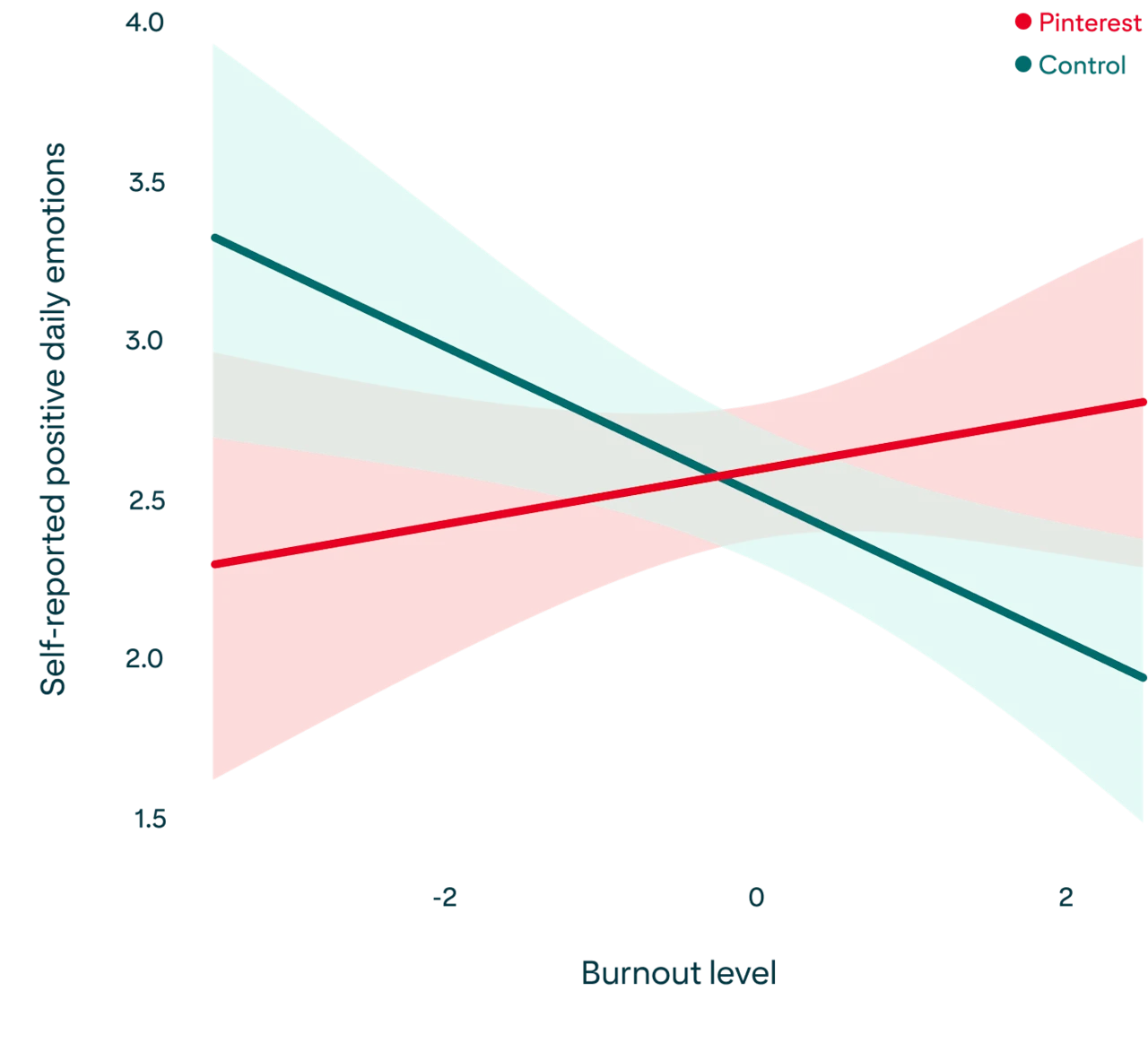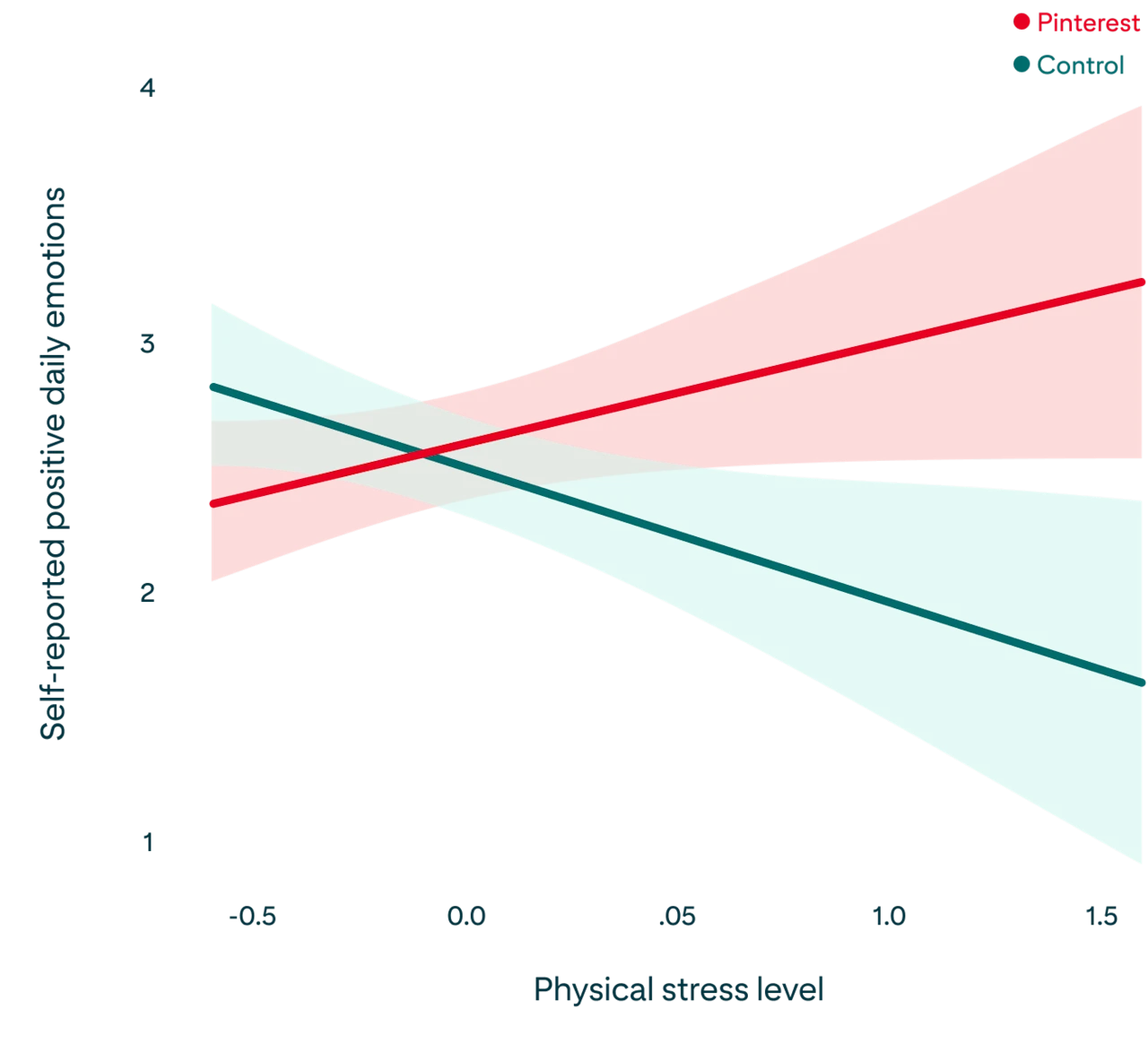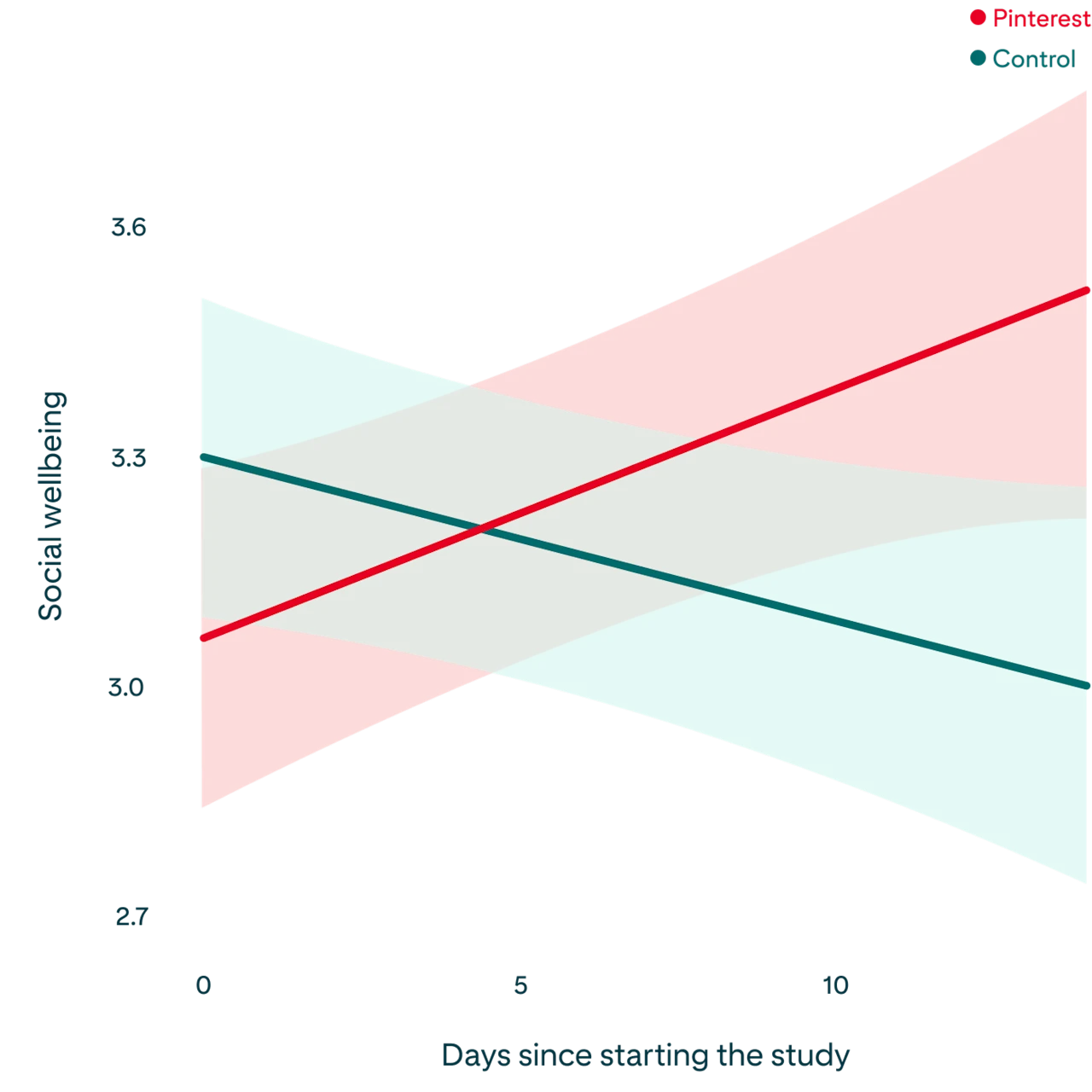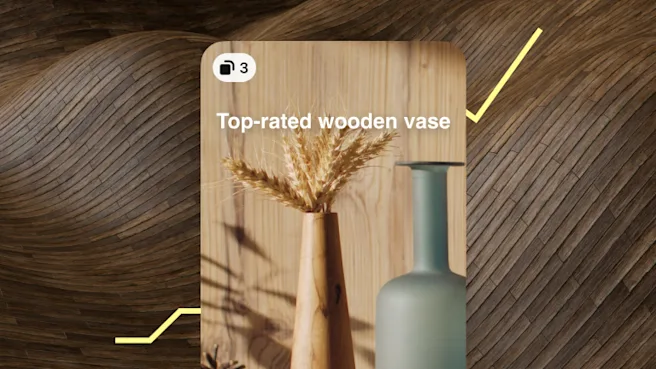Pinterest releases new research with UC Berkeley’s Greater Good Science Center
22 फ़रवरी 2023
A new study from UC Berkeley in the US shows the power of seeking inspiration. Daily interaction with inspiring content on Pinterest helped Gen Z university students to buffer against negative conditions such as burnout and stress—even when they were studying for stressful university exams.
UC Berkeley's researchers conducted an ‘intervention’ study that measured the impact of specific habits on well-being. This scientific, experimental research shows that an inspiration intervention can help people to preserve capacity for positive emotions. We’re sharing the full results of the study here, in partnership with UC Berkeley’s research team.
Overview
Pinterest partnered with UC Berkeley’s Greater Good Science Center to test the relationship between inspiration and well-being. Using an intervention study focused on inspiration, we found that active engagement with content on Pinterest buffers against rising burnout, stress and social disconnectedness among Gen Z university students in the US. Moreover, we found similar results in seven additional countries (total n = 418). In other words, seeking inspiration in challenging times can preserve your capacity for positive emotions, boost your feelings of social connection, and even prolong your sleep.
Methodology
Together with the Berkeley team, we designed rigorous, experimental research examining causal links between inspiration and well-being. The operational team consisted of one Pinterest researcher (Daron Sharps, PhD) and two Berkeley PhD candidates, with oversight and guidance from principal investigator Dacher Keltner. All procedures had oversight from UC Berkeley’s Committee for the Protection of Human Subjects. Moreover, all measures that we report are well established in the academic literature field, and are used in hundreds of peer-reviewed journal articles (e.g. ‘burnout’ refers to the Maslach Burnout Inventory, which has over 20,000 citations).1
Participants came to the social science lab at the Berkeley Way West building for entrance (Day 1) and exit (Day 14) surveys. Participants were randomly sorted into one of two conditions for the two weeks in between their surveys.2 Participants either: used Pinterest for 10 minutes per day (‘Pinterest condition’), or solved online jigsaw puzzles for 10 minutes per day (‘control condition’). For the Pinterest condition, we simply instructed the study participants to find things on Pinterest that inspired them. This was a self-directed exercise, without restrictions on product experience or content. In comparison, the control condition is interpreted as a neutral, baseline experience (i.e. online, visual, engaging), so that we could look at the true difference that Pinterest makes.
Importantly, we tested the effectiveness of the inspiration intervention among university students who were preparing for their end-of-term exams. This was not exactly a low-stress time!
Participants were primarily Gen Z (average participant age = 21). We also collected similar data from Gen Z participants in additional countries (Australia, Brazil, Canada, France, Germany, Japan and the UK).3
Results
First, we found that over the course of the study and moving towards the students’ end-of-term exam period, self-reports of burnout and anxiety increased. We even saw this in physiological measures of stress, such as vagal tone. Vagal tone is a measure of the activity of the vagus nerve, and indicates someone’s stress level. Low vagal tone is associated with poor emotional and attentional regulation. As students got closer to exams, their vagal tone dropped.4
However, in students assigned to the Pinterest condition, we found that seeking out inspiration for just 10 minutes a day buffered against the rising burnout, stress and social disconnectedness that we could see in their vagal tone data. This had consequences for emotional well-being, physical health and social connectedness.
Emotional well-being
Active engagement with inspiring content on Pinterest mitigated the consequences of burnout on people’s daily positive emotions, preserving their capacity to feel good. In other words, despite being burnt out, participants in the Pinterest condition (red line in the chart below) still had the capacity to feel contented, grateful and compassionate. In the control condition (blue line in the chart below), burnout swamped those emotions.5
Predicted values of daily positive emotions

Physical health
Active engagement with inspiring content on Pinterest mitigated the consequences of physical stress on people’s daily positive emotions, preserving their capacity to feel good. In other words, despite experiencing physical stressors such as headaches or trouble sleeping, participants in the Pinterest condition (red line in the chart below) still had the capacity to feel contented, grateful and compassionate. In the control condition (blue line in the chart below), physical stress pushed those emotions aside.6 Those who actively engaged with inspiring content on Pinterest also reported sleeping 7% longer.
Predicted values of daily positive emotions

Social connectedness
After two weeks of inspiration, social well-being increased for people in the Pinterest condition, but fell for those in the control group. Those who got a daily dose of inspiration on Pinterest (red line in the chart below) were more likely to feel that they have someone to turn to for advice, and less likely to withdraw from the people around them or feel disconnected from their communities, compared to the control condition (blue line in the chart below).7 This was most likely due to higher levels of stress in the end-of-term exam period, leading to social disconnectedness for those who didn’t get the buffering effect of inspiration.
Predicted values of social well-being

UK results
Using the same inspiration intervention and participant population (Gen Z) we replicated similar findings across the UK. We found that a daily dose of inspiration preserves people's capacity for daily positive emotions, buffers against feelings of social disconnectedness and even helps to keep up your motivation for completing tasks. We also found that higher levels of inspiration make it easier to relax. This higher level of relaxation was uniquely ‘unlocked’ by seeking inspiration on Pinterest, and was not true of the control condition. In the control condition group, who were playing online puzzle games, there was no relationship found between inspiration and relaxation. Furthermore, we found that a daily dose of inspiration makes you more likely to connect with nature. Other country-level findings available upon request.
What’s next for Pinterest
We're encouraged by these research results and the potential to help people improve their well-being. As a company, we have committed a third of our total philanthropic funds to the advancement of emotional well-being among young people. We're also proud to be partnering with the American Academy of Pediatrics and participating in the US Department of Health and Human Services Center of Excellence on Social Media and Mental Wellness.
We’re always learning from our partners and we’re grateful for how they’ve helped us to improve our platform. We support the US Surgeon General’s call to action on youth mental health, and appreciate that the US President used his State of the Union address to push us forwards on this bipartisan issue.
Appendix: Survey questions
These questions were used with survey participants to gauge how they felt throughout the study.
Daily positive emotions scale
Please think back on the experiences that you had today, and think about the feelings and emotions that you felt. For each word, please mark the number to show how strongly you felt the emotion or feeling today. (1 = Not at all, 2 = A little, 3 = A moderate amount, 4 = A lot, 5 = A great deal)
• Grateful
• Contented
• Proud
• Love
• Elated
• Interested
• Awe
• Amused
• Sexual desire
• Compassionate
Burnout scale
Please indicate how much you agree or disagree with the following statements about your work today. (1 = Strongly disagree, 7 = Strongly agree)
• I feel emotionally drained by my studies.
• I feel worn out at the end of a day of classes.
• I feel burnt out from my studies.
• I feel tired when I get up in the morning and I have to face another day of classes.
• Studying or attending a class is really a strain for me.
• I have become less interested in my studies since my enrolment at my university.
• I have become less enthusiastic about my studies.
• I have become more cynical about the potential usefulness of my studies.
• I doubt the significance of my studies.
• I can effectively solve the problems that arise in my studies.
• I believe that I make an effective contribution to the classes that I attend.
• In my opinion, I am a good student.
• I have learned many interesting things during the course of my studies.
• I feel stimulated when I achieve my study goals.
• During classes, I feel confident that I am getting work done efficiently.
Physical stress scale
How much have you been bothered by the following symptoms today? (1 = Not at all, 2 = A little, 3 = A moderate amount, 4 = A lot, 5 = A great deal)
• Stomach or bowel problems
• Back pain
• Neck pain
• Pain in your arms, legs or joints
• Headaches
• Chest pain or shortness of breath
• Dizziness
• Feeling tired or having low energy
• Trouble sleeping
Social well-being items
In this section, there are statements that may or may not describe thoughts and feelings that you had today. For each sentence, please indicate the answer that best describes your own experience today. (1 = Does not describe me, 2 = Describes me slightly well, 3 = Describes me moderately well, 4 = Describes me very well, 5 = Describes me extremely well)
• I had someone to turn to for advice on handling problems.
• I withdrew from the people around me. (Reverse-coded)
• I felt like I belonged to a community (such as a social group, your university or your neighbourhood).


